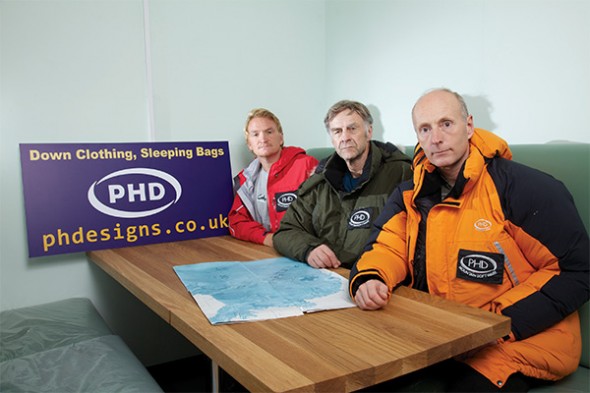
Veteran polar explorer, Sir Ranulph Fiennes, will take on one of the last remaining polar challenges by attempting to cross Antarctica in winter – the coldest journey on Earth – with five colleagues and with the support of the Commonwealth and a number of sponsors, including PHD down clothing. PHD are official suppliers of Down Jackets, Down Sleeping Bags, Down Trousers and Down Mitts and Boots to the expedition. Expedition Organiser & Leader, Sir Ranulph Fiennes, said PHD’s down clothing is “a keystone of our ability to mount this, the most difficult and ambitious polar challenge in history”.
On 6 December 2012, on board the expedition’s South African ice-strengthened research ship, ‘SA Agulhas’, the expedition team – led by Sir Ranulph – will leave London , bound for Antarctica. Their aim is to complete ‘The Coldest Journey’ – the first-ever trans-Antarctic winter expedition. The Coldest Journey will also attempt to raise USD10 million for Seeing is Believing, a global charitable initiative to fight avoidable blindness. During their sea voyage, the team will undertake a number of scientific tasks to provide unique data on marine life, oceanography and meteorology. Using the very latest technological innovations, this epoch-making journey will pave the way for a new dawn in Antarctic, year-round exploration.
On 21 March 2013, the equinox, the six expedition members will begin a six month journey to reach the Ross Sea. Their route from the Russian base of Novolazareskaya (‘Novo’) to Captain Scott’s base at McMurdo Sound – via the South Pole – will test the limits of human endurance. During this six month period the expedition team will travel nearly 4,000 kilometres, mostly in complete darkness in temperatures as low as -90°C. The expedition team will have to be entirely self-sufficient and there will be no search and rescue facility available, as aircraft cannot penetrate inland during winter, due to darkness and risk of fuel freezing.
Previously, the furthest any expedition has ever ventured into Antarctica during the winter is 60 miles. On this forthcoming journey, Sir Ranulph and his team will aim to cover 2,000 miles in six months, crossing the polar plateau at an average height of 10,000ft above sea level.
With a winter crossing of the Arctic having recently been completed by a Norwegian expedition, this is the first ever attempt at an Antarctic winter crossing and one of the last remaining polar challenges.
Of the Antarctic traverse, Sir Ranulph Fiennes, Expedition Leader of The Coldest Journey, said: “This will be my greatest challenge to date. We will stretch the limits of human endurance. Britain and the Commonwealth has a strong heritage of exploration, from Captain Cook 300 years ago to the present day. As such, it is fitting that a Commonwealth team should be the first to fulfil this last great polar expedition.
“It is a unique opportunity to carry out a number of scientific tasks in the extreme polar environment, which will make a significant contribution to our understanding of the true effects of global warming on the Antarctic continent.”
Sir Ranulph’s attempt to complete The Coldest Journey is the latest in the long line of record-breaking achievements that have seen him become the first man to reach both Poles by surface travel. It also follows his hike to the summit of Everest, where he became the oldest Briton ever to do so. The Coldest Journey represents what may be Sir Ranulph’s final expedition, and one which despite being aged 68, he could not have undertaken any earlier in life.
The Foreign & Commonwealth Office has not previously granted permits for winter expeditions in Antarctica as they are deemed too dangerous; a testament to the sophistication of the technology required for this traverse. Sir Ranulph and the expedition team will be equipped with high-tech equipment, including battery-powered heated clothing and specially designed breathing apparatus to enable them to survive at –70°C and possibly at -90°C.
The expedition departs from London in the centenary year of Captain Scott’s death in the Antarctic in 1912.
RELATED LINKS
www.thecoldestjourney.org
www.seeingisbelieving.org.uk
www.phdesigns.co.uk
